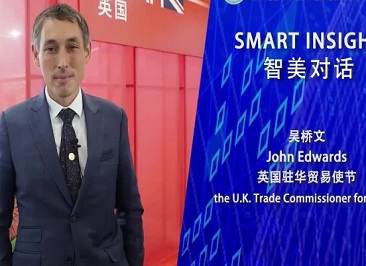Small Italian village launches its prized torrone cake on Silk Road to China
Updated:2019-04-25
Xinhua
A small mountain village in the middle of the Italian island of Sardinia has launched one of its most prized products on the Silk Road to China.
The village, called Tonara, has entered into a cultural and trade agreement with the Confucius Institute based in the Tuscan city of Pisa and the Galileo Galilei Italian Institute in Chongqing to bring one of its most renowned traditional products -- a traditional Christmas cake made of honey, almonds and egg yolks named "torrone" -- to Chinese consumers.
This, however, is just a first step in what local authorities hope will be a flourishing trade with China, one that will help prevent the depopulation of this village of 2,000 inhabitants, Mayor Flavia Loche told Xinhua.
OPENING UP MORE
"I have some very cosmopolitan ideas -- I want to open up my village to the world," said Loche, who started the dialogue by reaching out to the Confucius Institute in Pisa, which in turn reached out to the Galileo Galilei Italian Institute in Chongqing.
"We want to open up new markets for our products, because our village is losing population," Loche explained, adding that there is 10 percent unemployment in the area. "If we succeed, we will be able to employ all the jobless people in the area," said the mayor.
A part of this strategy, she said, is to include Chinese language classes in the local school system, where about 200 students are currently enrolled.
"I believe the study of foreign languages is essential, because it opens up your mind," Loche explained.
"We also believe it is important to offer Chinese in our schools, because if we want to promote new channels at both the trade and tourism level, our youth should have the proper education both in terms of the ability to receive visitors and the ability to travel to China."
Loche, who said she approves of Italy's formal endorsement of the Belt and Road Initiative in March, said that teaching Italian kids Chinese in school "is a fundamental stepping stone" not only towards learning a new language but also "towards learning about Chinese culture, about the technological innovations the Chinese are pioneering around the world, and about all their traditions".
The people of Tonara -- a settlement whose roots stretch back to pre-Roman times and who is also known as the "Sardinian capital of torrone" -- have always been merchants and artisans and have an entrepreneurial mentality, said Loche.
Some say torrone is the descendant of an ancient Roman recipe; others hold that it was brought across the Mediterranean to Italy by the Arabs after the fall of the Roman Empire.
Others still say it was invented in the mid-1400s in the northern city of Cremona on the Italian mainland, where a pastry chef concocted it for the wedding banquet of Bianca Maria Visconti and Francesco Sforza, the duke of Milan.
In Sardinia, up until the early 1960s, torrone was made by hand exclusively by women.
"We are a mountain village, so our main activity has always been trade, because we couldn't farm the land," Loche said. "We are essentially artisans and traders: the women stayed home making torrone, while the men traveled around Sardinia selling it from horse-drawn carts."
PROMOTING TORRONE IN CHINA
Now Tonara has four factories and nine artisanal laboratories that make torrone, which is exported to the rest of Europe, the United States, and Japan. They employ about 400 people, making torrone manufacturing the mainstay of the local economy, Loche explained.
"The first factories were built in the 1960s, but still today in people's homes you will find traditional "paioli" (cauldrons) used to make home-made torrone," she said, adding that while torrone recipes in other parts of Italy include sugar and dried fruits, torrone from Tonara is "the only one in the world that is made only with honey".
Tonara's first steps along the Silk Road took place during the 40th edition of the "sagra del torrone", a festival celebrating the mainstay product which attracted 25,000 visitors to the tiny mountain village earlier this week.
Sagras are local Italian festivals, some with roots going back to ancient Roman times. They are usually dedicated to a patron saint, a traditional food, or a local plant or animal.
This year, visitors to the sagra in Tonara included a delegation from the Confucius Institute, who entertained locals and visitors with demonstrations of calligraphy, kung fu dance, and tea ceremonies.
"This year we wanted to give our sagra a cultural impulse by intersecting the Silk Road with the Torrone Road," Loche said.
The visit to Tonara during the festival was "a great opportunity for cultural exchange", commented the Italian director of the Confucius Institute in Pisa Prof. Alberto Di Minin. "There is maximum commitment on our part to building the basis for every desirable development."
The Chinese director of the Institute, Huang Yunlin, said that "for us it is a pleasure to part in one of the most important events in Sardinia, in the hopes that it will mark the beginning of a solid collaboration".
"I think the Chinese culture is among the greatest in the world, and we are traders -- we're used to traveling far and wide," Loche added.
In November, she is heading to Chongqing as part of a delegation to promote Tonara's products, beginning with torrone but also including the area's award-winning wines and cheeses, and to promote Tonara, with its mineral water springs and beautiful natural scenery, as a tourist destination.
The Confucius Institute in Pisa and the Galileo Galilei Institute in Chongqing are the result of an agreement between the Sant'Anna School of Advanced Studies and Chongqing University, which was signed in Beijing in 2004.
Video

John Edwards, the UK trade commissioner for China, praised Chongqing over its rise as a burgeoning center in intelligent manufacturing.





